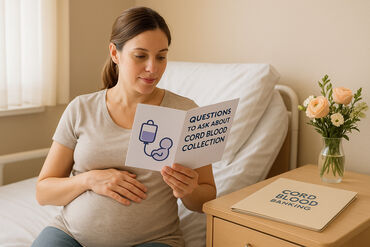Decoding Late Pregnancy Symptoms: What's Normal and When to Call Your Doctor
Late pregnancy can bring a mix of normal discomforts and warning signs. Here's what you need to know to stay safe and prepared:
- Normal Symptoms: Braxton Hicks contractions, mild swelling, sleep issues, body aches, and increased discharge are common as your body prepares for delivery.
- When to Call Your Doctor: Watch for heavy bleeding, severe abdominal pain, sudden swelling, vision issues, or reduced baby movement.
- Emergencies: Seek immediate care for symptoms like severe bleeding, high blood pressure, fluid leaks, or regular contractions before 37 weeks.
Quick Tip: Track symptoms like contractions, baby movement, and physical changes to discuss with your doctor. Stay informed to protect your health and your baby's well-being.
Normal Late Pregnancy Signs
As pregnancy nears its end, your body undergoes expected changes. Recognizing these signs can help you differentiate them from potential concerns.
Practice Contractions
Braxton Hicks contractions, experienced by over 90% of pregnant women, involve brief uterine tightening lasting 30–60 seconds, sometimes up to two minutes.
Here's how Braxton Hicks differ from true labor contractions:
| Characteristic | Braxton Hicks | True Labor |
|---|---|---|
| Timing | Irregular and sporadic | Regular and increasingly frequent |
| Duration | 30–60 seconds (up to 2 minutes) | 30–70 seconds, consistent |
| Intensity | Mild or decreases over time | Becomes progressively stronger |
| Location | Front or top of the uterus | Starts at the top and moves downward |
| Movement Effect | Stops with position changes | Persists regardless of activity |
It's essentially the uterus gearing up for labor, so that it is more effective in dilating the cervix when it's time to deliver. - Joseph Bouganim, M.D., OB/GYN
These contractions are just one of the many normal changes you might experience in late pregnancy.
Foot and Ankle Swelling
Fluid retention is common as your body increases blood and fluid production by 50%. This often leads to swelling (edema) in the feet and ankles, affecting about 75% of pregnant women and contributing to weight gain of up to 15 lbs by full term.
Tips to manage swelling:
- Elevate your feet when resting.
- Wear compression socks for better circulation.
- Stay hydrated with 8–10 glasses of water daily.
- Limit sodium intake.
- Engage in light activity like walking or swimming.
- Choose supportive footwear for comfort.
Sleep Issues and Low Energy
Pregnant women typically need around 10 hours of sleep, compared to the usual 8. However, sleep disruptions are common. About 15% develop restless legs syndrome, and 30% experience pregnancy-related snoring.
Common sleep challenges include:
- Frequent bathroom trips
- Back or muscle discomfort
- Heartburn
- Baby movements
- Nasal congestion
- Trouble finding a comfortable position due to a growing belly
Body Aches and Pains
As your body prepares for delivery, softening ligaments and loosening joints can lead to discomfort in the back, hips, and pelvis.
Ways to ease discomfort:
- Practice good posture throughout the day.
- Wear supportive shoes to reduce strain.
- Try a pregnancy support belt for added stability.
- Use heat or cold packs to soothe sore areas.
- Incorporate gentle stretching into your routine.
- Sleep with a pillow between your knees for better alignment.
Changes in Discharge
An increase in clear or white, non-irritating vaginal discharge is normal in late pregnancy. This helps maintain vaginal health and provides protection for your baby.
Understanding these common signs can help you feel more prepared as you approach delivery. The next section will address symptoms that may require more attention.
Signs to Call Your Doctor
Some changes during pregnancy go beyond the usual discomforts and need immediate attention.
Heavy Bleeding
If you experience any vaginal bleeding late in pregnancy, contact your doctor right away. While light spotting can happen, heavy or persistent bleeding requires urgent evaluation.
Severe Abdominal Pain
Reach out to your doctor immediately if you have intense lower abdominal or back pain, or if your temperature rises above 100.4°F.
Sudden Physical Changes
Watch for the following warning signs:
| Symptom | What to Watch For |
|---|---|
| Swelling | Rapid or severe swelling in your face, hands, or fingers |
| Headaches | Ongoing or severe headaches |
| Vision Issues | Blurry vision or seeing spots |
Reduced Baby Movement
After 28 weeks, a noticeable drop in fetal movement can be a concern. Your doctor may recommend a stress test or ultrasound to ensure everything is okay. If you notice a significant decrease or no movement for an extended period, call your provider.
Fluid Leaks or Early Contractions
If you experience a gush or steady trickle of clear fluid, or if you have regular, painful contractions before 37 weeks, contact your doctor immediately.
Being aware of these signs can help you decide whether to call your healthcare provider or seek emergency care.
Doctor Visit vs. Emergency Room
Deciding between a doctor visit and the emergency room can feel overwhelming, especially when symptoms arise during pregnancy. Here's a guide to help you act confidently and make informed decisions.
Schedule a Doctor Visit
For issues that aren't urgent but still require attention, reach out to your healthcare provider to schedule an appointment.
| Symptom | When to Call Your Doctor |
|---|---|
| Mild swelling | Slow, gradual swelling in feet or ankles |
| Braxton Hicks | Irregular and mild contractions |
| Sleep issues | Persistent trouble sleeping |
| Mild aches | Discomfort that improves with rest |
| Urinary changes | Frequent urination without pain |
Go to Emergency Room
Head to the emergency room if you experience any of the following serious conditions. These require immediate care:
| Emergency Symptom | What to Watch For |
|---|---|
| Severe bleeding | Heavy bleeding - see earlier guidance |
| High blood pressure | Readings at or above 160/110 |
| Breathing issues | Difficulty breathing or chest pain |
| Vision changes | Sudden blurriness or seeing spots |
| Loss of consciousness | Fainting or seizures |
| Labor signs | Regular contractions before 37 weeks |
If you're unsure whether your situation is urgent, don't hesitate to contact your healthcare provider for advice.
Emergency Planning
Preparing for emergencies can ease stress and save time when every second counts. Here's how to get ready:
- Pack an Emergency Kit: Include important documents, medications, registration forms, and personal essentials.
-
Keep Key Contacts Handy:
- Your healthcare provider's emergency numbers
- Direct line to the hospital's labor and delivery unit
- Transportation plan
- Contact info for a support person
-
Organize Medical Information:
- Keep details like your due date, pregnancy history, current complications, recent test results, and any allergies easily accessible.
When in doubt, always prioritize safety and seek professional guidance.
Staying Ready for Delivery
Regular Health Checkups
Prenatal care is a must, especially as your due date approaches. Your provider will likely increase the frequency of your appointments to keep a close eye on your health and your baby's well-being. These visits are key for spotting any issues early.
During these checkups, your doctor will:
- Check your blood pressure and weight
- Measure your baby's growth and position
- Monitor your baby's heart rate
- Address any symptoms or questions you have
Staying on top of those routine prenatal checkups is crucial, since they can help spot potential problems early and keep you and your sweet pea healthy. – What to Expect
Track Your Symptoms
Keeping track of your symptoms can make it easier to share details with your provider. Use a journal or an app to stay organized. Here’s what to monitor:
| What to Track | Details to Note |
|---|---|
| Contractions | Timing, duration, and intensity |
| Baby Movement | Frequency and patterns |
| Physical Changes | Swelling, discharge, or pain |
| Sleep Patterns | How long and how well you sleep |
| Unusual Symptoms | Type, severity, and when they occur |
If your contractions happen every 5 minutes consistently, it’s time to reach out to your healthcare provider. While tracking symptoms, you might also want to consider delivery preparations, like cord blood banking.
Cord Blood Banking Options
If you’re thinking about cord blood banking, it’s important to plan ahead. Americord offers newborn stem cell banking services through a variety of family plans. These stem cells could potentially benefit your child or even siblings, who have a 75% chance of being at least a partial match.
Here’s how to prepare for cord blood collection:
- Choose the banking plan that works for your family
- Schedule the delivery of your collection kit
- Pack the kit in your hospital bag
- Let your healthcare team know about your decision
Americord’s CryoMaxx™ Processing technology helps preserve the maximum number of stem cells, giving your family added peace of mind for the future.
Late Pregnancy: Key Takeaways
Late pregnancy comes with its fair share of changes. Knowing the difference between common discomforts and potential warning signs is crucial for your health and your baby's well-being.
Recognizing the warning signs and getting the right diagnosis and treatment as soon as possible can save lives. - Wanda Barfield, MD, MPH, RADM USPHS (Ret.), CDC Division of Reproductive Health Director
Here’s a quick guide to help you navigate symptoms:
| Symptom Type | What to Do |
|---|---|
| Common Discomforts | Track them and discuss at checkups |
| Warning Signs | Call your doctor right away |
| Emergencies | Go to the ER immediately |
For symptoms like severe headaches, vision problems, or a fever over 100.4°F, don’t wait - contact your healthcare provider immediately.
As you get closer to delivery, it’s also a good time to explore all your options, such as cord blood banking, which could benefit your family in the future.
Listening and taking the concerns of pregnant and recently pregnant women seriously is a simple, yet powerful, action. It can prevent serious health complications and death.
Always trust your instincts. Acting quickly and staying informed can make all the difference in ensuring a safe and healthy pregnancy.




